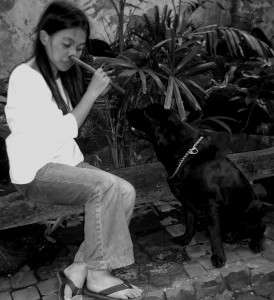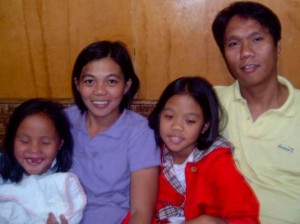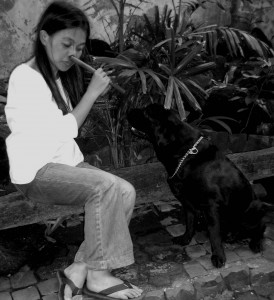By DESIREE CALUZA
(Conclusion)

BAGUIO CITY—It has been almost six years since her husband was killed along a lonely stretch of highway in Ilocos Sur, but Florence “Dom-an” Macagne Manegdeg refuses to end her quest for justice.
“Mabigat sa akin na hindi umuusad ang kaso (It’s a burden for me that this case is not moving forward). Others may consider it a cold case, but for me, it will always be a hot case,” Manegdeg said.
A health worker and flutist, Manegdeg was many miles away from the Philippines when her husband Pepe was killed in San Esteban town on the night of Nov. 28, 2005.
Pepe was waiting for a ride along the national highway in Barangay Apatot, hoping to be in Manila in time to fetch Manegdeg, then working in Hong Kong, who was arriving at 5 a.m. the next day. He never got on that bus; he was shot around 10 p.m., his body bearing 22 gunshot wounds.
The Ilocos police later tagged a member of the Army, Capt. Joel Castro of the 50th Infantry Battalion, as the main suspect. The provincial prosecutor initially said Castro was accompanied by five other men during the attack, but he dismissed the case in 2007, citing the retraction made by the lone witness.
Castro was even promoted to major when the case was dismissed, Manegdeg said.
“After the case was dismissed, I felt that there was no way that I should ever stop. Pepe was dead, but it should never be about a dead case of a dead person. It should be about keeping this case always alive. Pepe was part of an organization, and the bullets came from the military,” she said.
Jose Manegdeg’s death was recorded as a case of extrajudicial killing at the time Oplan Bantay Laya, a counter-insurgency program of the former Arroyo administration, became a flagship program of the Armed Forces of the Philippines.
Then 37 and a father of two, Pepe was the coordinator of the Rural Missionaries in the Philippines in the Cordillera and Ilocos. The group is the service program of the Roman Catholic church composed of religious superiors. The group focuses on rural development and organizes those from marginalized sectors such as farmers. As a coordinator, Pepe trained farmers and church people on development, environment, human rights and agriculture.
Manegdeg, more popularly known by her Igorot name “Dom-an” in peace advocacy circles, has told—and retold her story—in various arenas in the last six years. She has not given up the fight for justice for her husband’s killing.
“As I move on with my crisis as a widow, I can never be quiet, because silence is tantamount to the death of my spirit, and the spirit in me tells me that I should continue fighting for Pepe’s justice,” she said.
An appeal to the president
Shuttling back and forth between her hometown in Sagada, Mt. Province, and Manila where she is pursuing her studies on alternative medicine at the University of the East- Ramon Magsaysay Memorial Medical Center, Manegdeg makes sure she meets people whom she thinks can help her campaign for the reopening of her husband’s case.
She tirelessly gathers and photocopies documents, letters and statements she submits to lawyers, government agencies, officials, nongovernment agencies, the media and her fellow peace advocates.
She said President Benigno “Noynoy” Aquino III’s pronouncement on resolving extrajudicial killings in the country has raised her hopes.
When she was given the opportunity to visit Malacanang last Dec. 10 during the celebration of the International Human Rights Day, Manegdeg brought with her a letter addressed to Aquino.

“My children and I continue to await closure and answers to our question: “‘Who killed Papa and why?’ Yet, as we embrace our loss and sorrow, we also continue to journey with the power of love, of life, and of truth for peace and healing,” she wrote.
Although she was unable to present the letter to Aquino personally, she said she remains hopeful that her husband’s case would be given utmost attention by the president.
“Noynoy’s mother, the late former President Cory Aquino, was a widow. His father Ninoy (former Sen. Benigno Aquino Jr.) was also killed for political reasons just like my husband. I am sure that he will empathize with someone like me,” Manegdeg said.
The struggle for justice
Manegdeg has also appealed to the Commission on Human Rights, the Philippine National Police’s Task Force Usig, the Department of Justice and the Office of the Presidential Adviser on Peace Process to reinvestigate her husband’s case.
She even sought out high-ranking military officials, one of them Brig. Gen. Francisco Lanuza, commanding general of the 801st Infantry Brigade, “to look for answers.”
She chose to be nonbelligerent rather than confrontational when she met the general, even piquing his interest in organic farming, which she is also passionate about.
“General Lanuza and I talked about organic farming. I felt that he was passionate about organic farming. In our talk, I told him about the case of my husband, and he said he would be interested to know what happened,” she said.
To help her in her quest for justice, Manegdeg and her relatives and friends launched the Kasinaya Peace and Healing Center in Nadatngan village in Sagada, Mt. Province in last May.
The center provides “sacred space for respite and learning, and a home for those who are weary and in turmoil, yet resolve to move on with love, faith and hope towards transcending their woundedness into transformative and creative endeavors for peace and healing of people and environment.”
Six years of widowhood has turned Manegdeg into a staunch advocate for peace, for which she has been tailed, even harassed by men on motorcycles.
Wherever she goes, whether attending congressional hearings, peace summits, or facing justice and military officials, Manegdeg chooses to make her point through music.
She always carries her nose flute. In a congressional hearing on March 12, 2009, she played the flute before a panel of Human Rights Committee at the University of the Philippines Baguio here.
Manegdeg also played her flute when she attended the Frontline 5th Dublin International Platform for Human Rights Defenders in Dublin Castle, Ireland in February last year.
During the conference, she narrated the hardships of a widow who struggles every day in the midst of overwhelming grief. “I picked up my flute, wrote letters and appeals, sought dialogues and resolved to learn the art of peacemaking to redeem sanity, serenity and clarity amidst worsening chaos,” Manegdeg said.
Read the first part, DOJ to reopen ‘cold’ cases of extrajudicial killings
This story is part of the VERA Files project “Human Rights Case Watch” supported by The Asia Foundation and the United States Agency for International Development.
